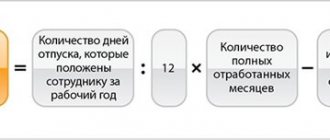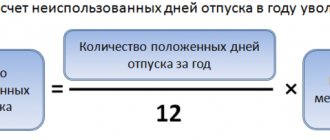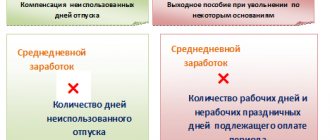For a year of work upon dismissal, the employee receives a compensation payment for the annual duration of vacation, unless, of course, he did not use this type of vacation. How many vacation days are due if 11 full or partial months have been worked, how to calculate compensation when dismissing an employee in this case?
The article discusses examples of calculations taking into account the explanations of the Ministry of Labor, which will help to understand various situations.
Initial data
The employee worked for 4 years 10 months and 23 days. In the first 4 years he took all his vacation, but in the last year he did not. How should you calculate vacation compensation upon dismissal?
In this example, the accountant considered that the employee should be paid compensation in proportion to the time worked during the year. As a result, it was calculated that he was entitled to compensation for 25.67 days.
The employee does not agree with this. In his opinion, despite the fact that he did not finish the year, he should receive compensation for all 28 days of vacation allotted to him.
In whose favor is this dispute being resolved?
Compensation for unused vacation upon dismissal for 11 months of work
Example. The employee submitted a letter of resignation of his own free will effective May 1, 2021. He needs to be paid compensation for 28 days of unused vacation. For the period of work from May 1, 2021 to April 30, 2021, he was paid a salary of 400,000 rubles. During the period of work, the employee was on sick leave from October 22 to 30, 2021 and on vacation from December 10 to 16, 2021.
The amount of payments due depends on the duration of work from the moment of hiring or the time that has passed since the previous vacation. Payments equal to the annual period are accrued upon reaching 11 months of work. Partial payments are subject to calculation based on the remaining days of unused vacation and the employee’s total income.
Legal basis
The Labor Code does not provide a mechanism for calculating length of service, on the basis of which the employee’s right to compensation for unused vacation is determined. Therefore, you should be guided by a document called “Rules on regular and additional leaves” (hereinafter referred to as the Rules). It was adopted in the USSR (approved on April 30, 1930), but in accordance with Article 423 of the Labor Code of the Russian Federation, those provisions that do not contradict the Labor Code are still in force.
According to paragraph 28 of the Rules, if the employee did not use the right to leave, the employer must compensate for this with money. Moreover, regardless of the reason for dismissal, an employee who has worked for at least 11 months is entitled to full compensation. The same paragraph contains a list of reasons for dismissal, when the employee is entitled to be paid full compensation despite the fact that he worked from 5.5 to 11 months.
So, if an employee has worked for more than 11 months or has worked less but quits for certain reasons, he is entitled to full compensation. In other cases, it must be calculated proportionally.
Calculation of the number of days of unused vacation upon dismissal
Taking into account the above, the number of vacation days to which an employee will be entitled upon dismissal if the duration of his vacation is 28 calendar days, depending on the length of leave and the basis for dismissal, is equal to the following values (see table below).
Also on this issue, see the materials in the information block “Encyclopedia of Solutions. Labor relations, personnel”, presented in the GARANT system. A resigning employee is entitled to monetary compensation for unused vacation. Moreover, compensation is paid for vacations accumulated over the entire period of work with a particular employer. To determine it, it is important to know the number of vacation days to which the employee was entitled at the time of dismissal and his average earnings.
Calculation of work period
When calculating length of service in months, the following approach is used: the month is rounded up to a full month if the employee has worked more than half of it . This is defined in paragraph 35 of the Rules mentioned above.
Rostrud, in letter No. 14-1/B-1074 dated October 28, 2016, gives the following explanation: if an employee worked 10 months and 20 days in a year, then his length of service is rounded up to 11 months. Such an employee is entitled to full vacation compensation.
It would seem that we can put an end to this, but not everything is so simple.
Position of Rostrud
In its other letters (dated 03/04/2013 No. 164-6-1, dated 08/09/2011 No. 2368-6-1) Rostrud expresses the opinion that paragraph 28 of the Rules should be applied in a certain case. Namely, if the employee has been working in the organization for the first year .
It follows from this that if a person did not complete his vacation in the first year after employment and decided to quit, then his compensation should be calculated in accordance with paragraph 28 of the Rules. If we are talking about compensation for the second and subsequent years of work, then it must be calculated in proportion to the months worked .
However, paragraph 28 of the Rules does not say anything about the first year of work. There we are talking about 11 months, which are subject to counting towards the length of service, which affects the right to receive leave. At the same time, in accordance with Article 114 of the Labor Code of the Russian Federation, the employee is entitled to leave not only for the first year - it is annual. It turns out that the position of Rostrud is ambiguous.
Indeed, in 2014, Rostrud changed its opinion regarding the application of paragraph 28 of the Rules (Minutes of June 19, 2014 No. 2). Now officials believe that 11 months means the period of the working year , that is, the time for which vacation is granted, and not the total duration of work in an organization or for an individual entrepreneur.
If this norm is interpreted differently, Rostrud notes, then there will be unequal treatment of workers who have been working for the first year and those who have been working for a longer period of time. That is, the fact of discrimination is obvious. And in accordance with Article 2 of the Labor Code, discrimination in the sphere of labor is prohibited - this is one of the most important principles of legal regulation of labor relations.
At the same time, the employer is allowed to establish differences, exceptions and preferences, as well as limit the rights of employees if this is caused by the requirements of a particular type of work, the state’s concern for vulnerable segments of the population, and so on. But the case of calculating compensation for unused vacation does not fit within the framework of these restrictions or exceptions.
So, when calculating compensation for leave upon dismissal, the approach from paragraph 28 of the Rules should be applied to all employees , and not just to those who have been working for the first year.
If 11 12, what is 11 12?
Average daily earnings are calculated in the same way as when paying vacation pay, that is, according to the rules described in detail in the Regulations on the specifics of the procedure for calculating average wages. The number of vacation days granted for the entire period of work in the organization is usually known. Therefore, the most difficult thing is to determine the total number of vacation days due to the employee for all this time.
- The rules link the right to vacation specifically to the working year. Consequently, the amount of compensation should depend on the time worked in the working year, and not on the total duration of the period of work in the company;
- Paying full compensation for 5.5 or 11 months only to those who have worked for less than a year leads to discrimination against other workers.
Arbitrage practice
There are several decisions of courts of various instances that confirm the conclusions made above. Moreover, some of them were adopted even before Rostrud changed its opinion. Here are examples of such solutions:
- Ruling of the Sverdlovsk Regional Court dated July 14, 2009 in case No. 33-7241/2009.
- Appeal ruling of the Khabarovsk Regional Court dated November 1, 2013 in case No. 33-6763.
- Appeal ruling of the Altai Regional Court dated May 21, 2014 in case No. 33-4186/2014.
- Ruling of the Murmansk Regional Court dated June 24, 2015 No. 33-1833—2015.
Question 8
The average daily earnings for payment of vacations granted in working days, in cases provided for by this Code, as well as for payment of compensation for unused vacations, are determined by dividing the amount of accrued wages by the number of working days according to the calendar of a six-day working week.
In accordance with Article 139 of the Labor Code of the Russian Federation and paragraph 4 of Decree of the Government of the Russian Federation of December 24, 2021 N 922, the calculation period for calculating average earnings is 12 months. At the same time, please note that in accordance with paragraph 5 of the above-mentioned Resolution, some periods are excluded and calculations (for example, downtime or those periods for which the employee retained average earnings) - the amount of wages for the billing month is adjusted accordingly.
Is it possible to go on vacation at a time convenient for you?
For ordinary workers, the only way to go on vacation at the right time is through early arrangements. When drawing up a schedule, it is necessary to discuss in advance with management and colleagues who will go on vacation and during what period.
Employees who have been recalled from their previous rest period can begin resting at any time. If, due to unforeseen circumstances, the organization requires workers, then management may ask the person to come to work. In the future, he will have the opportunity to choose any date for his vacation. It is worth noting that pregnant women and people who work in hazardous work cannot be recalled from vacation.
Knowing when you can count on rest and how long it should last helps a person in everyday work life. The rules apply to absolutely all organizations that hire workers under an employment contract. If a worker’s rights are violated, they must be defended by appealing to the labor inspectorate or district court.
Top
Write your question in the form below
Right or obligation of the employer?
Leave is provided to employees as standard.
According to Article No. 123 of the Labor Code, every year the management of the enterprise must develop a vacation schedule, taking into account the opinion of the trade union organization. This is done in writing. The employee must confirm the fact of familiarization with the information and consent to go on leave with a personal signature. Certain difficulties and questions arise when arranging vacation days for a recently hired subordinate. Let's say an employee decides to take his first vacation after starting a job in 11 months.
The employee has worked for several years in the organization upon dismissal, compensation for 11 months
Such employees are paid compensation upon dismissal at the rate of two working days per month of work (Article 291 of the Labor Code of the Russian Federation). For other categories of employees, the procedure for calculating the number of days of unused vacation is not regulated by federal legislation. At the same time, currently, on the basis of part one of Art.
Rationale for the conclusion: Upon dismissal, the employee is paid monetary compensation for all unused vacations (Article 127 of the Labor Code of the Russian Federation). The procedure for calculating the number of vacation days due to an employee based on his length of service with a given employer for the purpose of paying monetary compensation upon dismissal is provided by the Labor Code of the Russian Federation only for employees who have entered into an employment contract for a period of up to two months.
Login for clients
According to Art. 121 of the Labor Code of the Russian Federation, the time granted at the request of the employee without pay, not exceeding 14 calendar days during the working year, is included in the vacation period. This means that 6 calendar days (20 - 14) of administrative leave are not included in the vacation period. Therefore, compensation must be paid for 1 year 6 months 14 days; when converted to months, it will be 18 months (14 days are discarded, since they are less than half a month). Thus, the employee must be paid compensation for 23.94 calendar days (2.33 calendar days x 18 months - 18 calendar days), when rounded - for 24 calendar days.
Due to the fact that the duration of vacation is 36 calendar days, for each month worked the employee is entitled to 3 calendar days (36 calendar days / 12 months). Therefore, the employee must be paid compensation for 27 calendar days (3 calendar days x 9 months).
Common Mistakes
The submission procedure in some organizations is accompanied by many errors. If the procedure for granting rest is structured incorrectly, then after the employee submits the application, it can be considered within a month, and an order to leave can be issued 1 day before it begins.
Among the most common mistakes are:
- indication in the order instead of the work period of a calendar year;
- lack of a vacation schedule in the organization;
- lack of notification to the employee about going on vacation (the organization must notify the worker 2 weeks before the start of the vacation);
- dividing the holiday into parts without agreement.
If the company does not notify the person, then he does not have time to submit a request for vacation pay in time. Because of this, he has problems with accounting.
To ensure that the HR department does not make mistakes when drawing up an order, it is necessary to use standardized samples. When calculating individual indicators, it is necessary to use formulas that are regulated by law. By using them, the likelihood of making an error will be significantly reduced.
What is indicated in the Labor Code about vacation
The Labor Code is the main act that regulates the rights and obligations of the employee and the employer. It details when a person can count on rest, how long it should last, and in what cases it can be provided ahead of time.
After studying the norms specified in the Code, you can learn more about your rights and responsibilities, including those related to retirement. An employee has the right to refuse a vacation and receive monetary compensation, but this manipulation can be carried out no more than 2 times in a row.
ConsultantPlus: Forums
I see, then please explain to me how to calculate compensation for 7 days worked, following the rules that you gave as an example: “. when determining the number of vacation days for which compensation must be paid to the employee upon dismissal, it must be taken into account that if the employee worked less than half a month, then the specified time is excluded from the calculation, and if half or more than half of the month was worked, then the specified period is rounded up to a full month. » That is, in my case it turns out that the employee worked less than half a month, and there is nothing to round up. In your example, the employee worked, albeit not a full month, but 3 months, this is all rounded up to a full month, but for me it didn’t even work out to a month. What should I round up? Based on what should he count?
In our company, an employee is leaving who has not yet completed the probationary period (2 months). Please tell me whether he is entitled to compensation upon dismissal for unused vacation or not? And if it’s not difficult, at what point does an employee become entitled to this compensation and where is it stated? Because this is not the first time this has happened to us.







